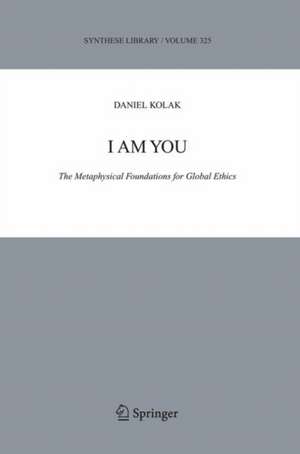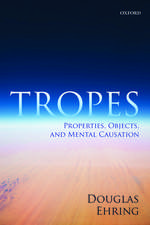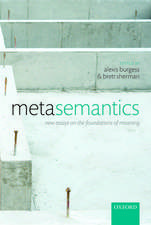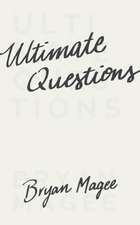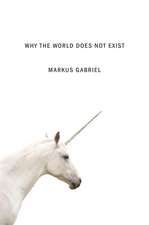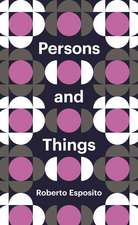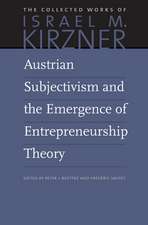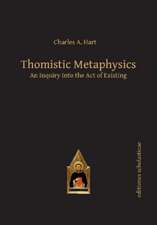I Am You: The Metaphysical Foundations for Global Ethics: Synthese Library, cartea 325
Autor Daniel Kolaken Limba Engleză Hardback – 5 ian 2005
- offers a new explanation both of consciousness and of self-consciousness
- constructs a new theory of Self
- explains psychopathologies (e.g. multiple personality disorder, schizophrenia)
- shows Open Individualism to be the best competing explanation of who we are
- provides the metaphysical foundations for global ethics.
The book is intended for philosophers and the philosophically inclined - physicists, mathematicians, psychiatrists, psychologists, linguists, computer scientists, economists, and communication theorists. It is accessible to graduate students and advanced undergraduates.
| Toate formatele și edițiile | Preț | Express |
|---|---|---|
| Paperback (1) | 1833.95 lei 6-8 săpt. | |
| SPRINGER NETHERLANDS – 28 oct 2010 | 1833.95 lei 6-8 săpt. | |
| Hardback (1) | 1840.43 lei 6-8 săpt. | |
| SPRINGER NETHERLANDS – 5 ian 2005 | 1840.43 lei 6-8 săpt. |
Din seria Synthese Library
- 15%
 Preț: 638.43 lei
Preț: 638.43 lei - 18%
 Preț: 989.98 lei
Preț: 989.98 lei - 15%
 Preț: 596.69 lei
Preț: 596.69 lei - 18%
 Preț: 903.93 lei
Preț: 903.93 lei - 15%
 Preț: 586.88 lei
Preț: 586.88 lei - 15%
 Preț: 696.50 lei
Preț: 696.50 lei - 18%
 Preț: 892.90 lei
Preț: 892.90 lei - 15%
 Preț: 643.34 lei
Preț: 643.34 lei -
 Preț: 282.33 lei
Preț: 282.33 lei - 5%
 Preț: 372.19 lei
Preț: 372.19 lei -
 Preț: 443.10 lei
Preț: 443.10 lei - 15%
 Preț: 637.59 lei
Preț: 637.59 lei - 18%
 Preț: 958.88 lei
Preț: 958.88 lei - 15%
 Preț: 642.36 lei
Preț: 642.36 lei - 18%
 Preț: 1230.66 lei
Preț: 1230.66 lei - 15%
 Preț: 642.83 lei
Preț: 642.83 lei - 18%
 Preț: 1000.39 lei
Preț: 1000.39 lei -
 Preț: 389.70 lei
Preț: 389.70 lei - 15%
 Preț: 637.28 lei
Preț: 637.28 lei - 18%
 Preț: 952.26 lei
Preț: 952.26 lei - 18%
 Preț: 1231.32 lei
Preț: 1231.32 lei - 15%
 Preț: 645.96 lei
Preț: 645.96 lei -
 Preț: 395.85 lei
Preț: 395.85 lei -
 Preț: 400.47 lei
Preț: 400.47 lei - 18%
 Preț: 1225.48 lei
Preț: 1225.48 lei - 15%
 Preț: 638.89 lei
Preț: 638.89 lei - 18%
 Preț: 1232.09 lei
Preț: 1232.09 lei -
 Preț: 380.45 lei
Preț: 380.45 lei -
 Preț: 394.87 lei
Preț: 394.87 lei - 15%
 Preț: 640.37 lei
Preț: 640.37 lei - 15%
 Preț: 639.08 lei
Preț: 639.08 lei -
 Preț: 381.98 lei
Preț: 381.98 lei - 15%
 Preț: 643.00 lei
Preț: 643.00 lei - 15%
 Preț: 672.29 lei
Preț: 672.29 lei
Preț: 1840.43 lei
Preț vechi: 2244.43 lei
-18% Nou
Puncte Express: 2761
Preț estimativ în valută:
352.21€ • 363.85$ • 293.13£
352.21€ • 363.85$ • 293.13£
Carte tipărită la comandă
Livrare economică 25 martie-08 aprilie
Preluare comenzi: 021 569.72.76
Specificații
ISBN-13: 9781402029998
ISBN-10: 1402029993
Pagini: 684
Ilustrații: XXIII, 659 p.
Dimensiuni: 210 x 297 x 42 mm
Greutate: 1.13 kg
Ediția:2004
Editura: SPRINGER NETHERLANDS
Colecția Springer
Seria Synthese Library
Locul publicării:Dordrecht, Netherlands
ISBN-10: 1402029993
Pagini: 684
Ilustrații: XXIII, 659 p.
Dimensiuni: 210 x 297 x 42 mm
Greutate: 1.13 kg
Ediția:2004
Editura: SPRINGER NETHERLANDS
Colecția Springer
Seria Synthese Library
Locul publicării:Dordrecht, Netherlands
Public țintă
ResearchCuprins
Personal Borders.- Border Control.- Physiological Borders.- Neurological Borders.- Spatial Borders.- Psychological Borders.- Causal Borders.- Metaphysical Borders.- Identity Borders.- Phenomenological Borders.- Transcendental Borders.- Moral Borders.
Textul de pe ultima copertă
Borders enclose and separate us. We assign to them tremendous significance. Along them we draw supposedly uncrossable boundaries within which we believe our individual identities begin and end, erecting the metaphysical dividing walls that enclose each one of us into numerically identical, numerically distinct, entities: persons. Do the borders between us—physical, psychological, neurological, causal, spatial, temporal, etc.—merit the metaphysical significance ordinarily accorded them? The central thesis of I Am You is that our borders do not signify boundaries between persons. We are all the same person. Variations on this heretical theme have been voiced periodically throughout the ages (the Upanishads, Averroës, Giordano Bruno, Josiah Royce, Schrödinger, Fred Hoyle, Freeman Dyson). In presenting his arguments, the author relies on detailed analyses of recent formal work on personal identity, especially that of Derek Parfit, Sydney Shoemaker, Robert Nozick, David Wiggins, Daniel C. Dennett and Thomas Nagel, while incorporating the views of Descartes, Leibniz, Wittgenstein, Schopenhauer, Kant, Husserl and Brouwer. His development of the implied moral theory is inspired by, and draws on, Rawls, Sidgwick, Kant and again Parfit. The traditional, commonsense view that we are each a separate person numerically identical to ourselves over time, i.e., that personal identity is closed under known individuating and identifying borders—what the author calls Closed Individualism—is shown to be incoherent. The demonstration that personal identity is not closed but open points collectively in one of two new directions: either there are no continuously existing, self-identical persons over time in the sense ordinarily understood—the sort of view developed by philosophers as diverse as Buddha, Hume and most recently Derek Parfit, what the author calls Empty Individualism—or else you are everyone, i.e., personal identity is notclosed under known individuating and identifying borders, what the author calls Open Individualism. In making his case, the author:
* offers a new explanation both of consciousness and of self-consciousness
* constructs a new theory of Self
* explains psychopathologies (e.g. multiple personality disorder, schizophrenia)
* shows Open Individualism to be the best competing explanation of who we are
* provides the metaphysical foundations for global ethics.
The book is intended for philosophers and the philosophically inclined—physicists, mathematicians, psychiatrists, psychologists, linguists, computer scientists, economists, and communication theorists. It is accessible to graduate students and advanced undergraduates.
* offers a new explanation both of consciousness and of self-consciousness
* constructs a new theory of Self
* explains psychopathologies (e.g. multiple personality disorder, schizophrenia)
* shows Open Individualism to be the best competing explanation of who we are
* provides the metaphysical foundations for global ethics.
The book is intended for philosophers and the philosophically inclined—physicists, mathematicians, psychiatrists, psychologists, linguists, computer scientists, economists, and communication theorists. It is accessible to graduate students and advanced undergraduates.
Caracteristici
Offers a new explanation both of consciousness and of self-consciousness Constructs a new theory of Self Explains psychopathologies (e.g. multiple personality disorder, schizophrenia) Shows Open Individualism to be the best competing explanation of who we are Provides the metaphysical foundations for global ethics Includes supplementary material: sn.pub/extras
